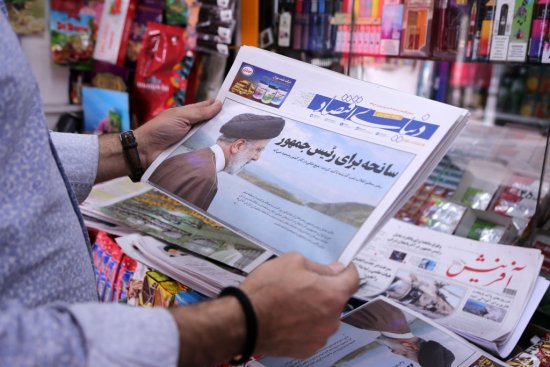
Nicknamed “the butcher of Tehran,” the late Iranian President helped oversee the mass executions of thousands in 1988.
Iranian President Ebrahim Raisi, a protege of Supreme Leader Ali Khamenei, as well as Foreign Minister Hossein Amir-Abdollahian were killed in a helicopter crash on Sunday. The pair were returning to Tehran after attending a ceremony with Azerbaijani President Ilham Aliyev on the Iran-Azerbaijan border to inaugurate the building of the new Qiz Qalasi Dam.
Khamenei said that the country would undergo a five-day mourning period. “This bitter tragedy took place while he was serving the people. The entire period that this great, self-sacrificing man held various responsibilities, both during his presidency and before that, he was totally dedicated to serving the people and Islam nonstop,” Khamenei posted on his official X account.
[time-brightcove not-tgx=”true”]But for ordinary Iranians, Raisi leaves behind a controversial legacy. Nicknamed “the butcher of Tehran,” he helped oversee the mass executions of thousands of political prisoners in 1988 as the country’s then-deputy prosecutor general. He later referred to that period as “one of the proud achievements of the system” in a May 2018 lecture, according to Amnesty International.
Raisi was seen as a hardliner, and one year after he became President, he ordered in 2022 authorities to tighten their enforcement of Iran’s strict hijab laws. Weeks after the order, Mahsa Amini was killed in police custody after being arrested for allegedly improper hijab. Her death prompted mass protests across the country, with some publicly calling for the end of the regime.
Some Iranians have even gone so far as to celebrate Raisi’s death. The daughters of Minoo Majidi, a 62-year-old woman killed during the September 2022 protests in Iran, posted a video of themselves toasting to his death. Footage of fireworks going off on the streets of one Iranian city were also circulating on social media, though they have yet to be independently verified.
Iran’s Vice President Mohammad Mokhber will automatically assume the presidency following Raisi’s death. But Iran faces a potentially major succession crisis, as Supreme Leader Ali Khamenei is 85 years old and reportedly in poor health.
“Raisi’s death poses two important challenges to the ruling order in Iran. 1) it will change the scenarios for succession and related to that 2) the hard right has no immediate candidate to succeed Raisi,” said Vali Nasr, a professor at Johns Hopkins School of International Relations who specializes in Iran, in a post on X.
“That may open the door for conservatives, thus far sidelined, to make a comeback.”